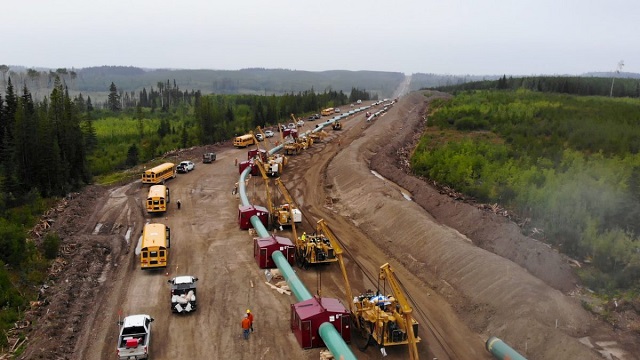Energy
Canada wallows on LNG sidelines, paralyzed by Ottawa’s onerous regulatory system

From the Frontier Centre for Public Policy
By Lee Harding
Mitsotakis said Greece has built a major facility outside the city of Alexandroupolis to process incoming LNG tankers. He said Greece will pump LNG to the rest of Europe and needs more at home as the country abandons coal.
When it comes to fossil fuels, the world wants what Canada’s got. The problem is, Prime Minister Justin Trudeau doesn’t care.
Fresh proof came with the recent visit of Kyriakos Mitsotakis, the first Greek leader to come to Canada in more than 40 years.
According to the office of the Prime Minister Trudeau, Mitsotakis was simply here to march in Montreal’s Greek Independence Day Parade, discuss “shared interests” and cut the ribbon as Greece purchased Canadian-made firefighting planes.
But, during an interview with CTV, Mitsotakis said his country would “of course” like to start importing Canadian liquified natural gas (LNG).
“We are a big entry point for LNG, not just for the Greek market, but also for the Balkans, for Eastern Europe. Theoretically, we could even supply Ukraine,” said Mitsotakis.
“In principle, yes, we are very interested in obtaining LNG at competitive prices.”
Mitsotakis said Greece has built a major facility outside the city of Alexandroupolis to process incoming LNG tankers. He said Greece will pump LNG to the rest of Europe and needs more at home as the country abandons coal.
Much of Europe’s energy has traditionally come from Russia or Middle Eastern autocracies. More than a decade ago, author Ezra Levant made the case for Canada’s “Ethical Oil” as a better alternative. Canada’s status as a democratic state that respects human rights and extracts oil with a minimal environmental footprint is as good as it gets. Mitsotakis, a Harvard-educated investment banker, understands that quite readily today.
“Canada is a country (for) which we share so many values,” said Mitsotakis. “I think we see eye-to-eye on many of the challenges that we face.”
Still, there was no mention of energy exports in Trudeau’s public comments regarding Mitsotakis, nor in official government communications about the visit.
Mitsotakis can take little consolation that his treatment is not unusual, as true as that may be. In the past 18 months, both the Japanese prime minister and the German chancellor returned home without official assurances that Ottawa was eager to offer bulk quantities of Canadian LNG.
Japanese Prime Minister Fumio Kishida came to Canada in January, 2023 making no secret of his “high expectations” to reach an LNG export agreement with Canada.
In August 2022, German Chancellor Olaf Scholz came to Canada hoping to reach an LNG deal. “Canada is our partner of choice,” Scholz said at the time.
Somehow, Trudeau said at a press conference with the German leader that there was no “business case” for LNG exports to Europe. Instead, he took the chancellor to an empty field in Newfoundland that was the chosen site for a future Canadian facility to export carbon-neutral hydrogen.
That will help Germany a little, but not nearly enough. The country turned to Qatar and signed a 15-year LNG export deal.
Canada is currently the world’s fifth largest producer of natural gas. But, as is the case with oil, facilities to sell it overseas are very limited. Canada has no LNG export facilities currently operating. Any LNG exports to Europe would have to go through a US export terminal.
Kitimat, BC will open a major export facility in early 2025, but plans to build an LNG pipeline to ports on the East Coast have fallen apart due to high costs.
On Monday, Alberta Energy Minister Brian Jean said “onerous” regulatory procedures were more to blame.
“With massive natural gas reserves, Canada can no longer wait on the LNG sidelines, burdened by an onerous regulatory system. Our allies and trading partners need us. We must have more LNG export facilities approved and built,” Jean said in a statement.
Jean is right. Canada has scuttled one opportunity after another during the Trudeau era, first by smothering pipeline development in onerous regulations. The Northern Gateway pipeline was the only one the nation banned, citing environmental concerns off the coast of northern B.C., despite the fact that 50 tankers passed the same waters every day with exports from Alaska.
Other proposals, such as the Energy East pipeline, were held up in red tape until its proponents decided the project wasn’t worth it. A 30,000-page application went for not, as did the hope that refineries in the Maritimes could refine Canadian products instead of those from the Middle East.
The trans mountain pipeline was also bound up until the government bought it, after which its progress still went painfully slowly. Years late and six times over-budget at a cost of $34 billion, the “long delayed” pipeline is finally ready for crude deliveries.
Bill C-69, dubbed by former Alberta Premier Jason Kenney as the “No More Pipelines Act”, was declared unconstitutional by the Supreme Court of Canada last fall. The development is welcome but cannot restore lost time.
Canada remains poorly positioned to capitalize on another historic opportunity–the European thirst for oil as it tries to distance itself from Russia. Unfortunately, this problem seems more convenient to Ottawa than not. The Canadian government seems more interested in having zero carbon emissions even if that means zero economy. Too bad that makes zero sense.
Lee Harding is a Research Fellow at the Frontier Centre for Public Policy
Carbon Tax
Carney fails to undo Trudeau’s devastating energy policies

From the Fraser Institute
By Tegan Hill and Elmira Aliakbari
On the campaign trail and after he became prime minister, Mark Carney has repeatedly promised to make Canada an “energy superpower.” But, as evidenced by its first budget, the Carney government has simply reaffirmed the failed plans of the past decade and embraced the damaging energy policies of the Trudeau government.
First, consider the Trudeau government’s policy legacy. There’s Bill C-69 (the “no pipelines act”), the new electricity regulations (which aim to phase out natural gas as a power source starting this year), Bill C-48 (which bans large oil tankers off British Columbia’s northern coast and limit Canadian exports to international markets), the cap on emissions only from the oil and gas sector (even though greenhouse gas emissions have the same effect on the environment regardless of the source), stricter regulations for methane emissions (again, impacting the oil and gas sector), and numerous “net-zero” policies.
According to a recent analysis, fully implementing these measures under Trudeau government’s emissions reduction plan would result in 164,000 job losses and shrink Canada’s economic output by 6.2 per cent by the end of the decade compared to a scenario where we don’t have these policies in effect. For Canadian workers, this will mean losing $6,700 (annually, on average) by 2030.
Unfortunately, the Carney government’s budget offers no retreat from these damaging policies. While Carney scrapped the consumer carbon tax, he plans to “strengthen” the carbon tax on industrial emitters and the cost will be passed along to everyday Canadians—so the carbon tax will still cost you, it just won’t be visible.
There’s also been a lot of buzz over the possible removal of the oil and gas emissions cap. But to be clear, the budget reads: “Effective carbon markets, enhanced oil and gas methane regulations, and the deployment at scale of technologies such as carbon capture and storage would create the circumstances whereby the oil and gas emissions cap would no longer be required as it would have marginal value in reducing emissions.” Put simply, the cap remains in place, and based on the budget, the government has no real plans to remove it.
Again, the cap singles out one source (the oil and gas sector) of carbon emissions, even when reducing emissions in other sectors may come at a lower cost. For example, suppose it costs $100 to reduce a tonne of emissions from the oil and gas sector, but in another sector, it costs only $25 a tonne. Why force emissions reductions in a single sector that may come at a higher cost? An emission is an emission regardless of were it comes from. Moreover, like all these policies, the cap will likely shrink the Canadian economy. According to a 2024 Deloitte study, from 2030 to 2040, the cap will shrink the Canadian economy (measured by inflation-adjusted GDP) by $280 billion, and result in lower wages, job losses and a decline in tax revenue.
At the same time, the Carney government plans to continue to throw money at a range of “green” spending and tax initiatives. But since 2014, the combined spending and forgone revenue (due to tax credits, etc.) by Ottawa and provincial governments in Ontario, Quebec, British Columbia and Alberta totals at least $158 billion to promote the so-called “green economy.” Yet despite this massive spending, the green sector’s contribution to Canada’s economy has barely changed, from 3.1 per cent of Canada’s economic output in 2014 to 3.6 per cent in 2023.
In his first budget, Prime Minister Carney largely stuck to the Trudeau government playbook on energy and climate policy. Ottawa will continue to funnel taxpayer dollars to the “green economy” while restricting the oil and gas sector and hamstringing Canada’s economic potential. So much for becoming an energy superpower.
Business
Large-scale energy investments remain a pipe dream

I view the recent announcements by the Government of Canada as window dressing, and not addressing the fundamental issue which is that projects are drowning in bureaucratic red tape and regulatory overburden. We don’t need them picking winners and losers, a fool’s errand in my opinion, but rather make it easier to do business within Canada and stop the hemorrhaging of Foreign Direct Investment from this country.
Thanks for reading William’s Substack!
Subscribe for free to receive new posts and support my work.
Changes are afoot—reportedly, carve-outs and tweaks to federal regulations that would help attract investment in a new oil pipeline from Alberta. But any private proponent to come out of this deal will presumably be handpicked to advance through the narrow Bill C-5 window, aided by one-off fixes and exemptions.
That approach can only move us so far. It doesn’t address the underlying problem.
Anyone in the investment world will tell you a patchwork of adjustments is nowhere near enough to unlock the large-scale energy investment this country needs. And from that investor’s perspective, the horizon stretches far beyond a single political cycle. Even if this government promises clarity today in the much-anticipated memorandum of understanding (MOU), who knows whether it will be around by the time any major proposal actually moves forward.
With all of the talk of “nation-building” projects, I have often been asked what my thoughts are about what we must see from the federal government.
The energy sector is the file the feds have to get right. It is by far the largest component of Canadian exports, with oil accounting for $147 billion in 2024 (20 percent of all exports), and energy as a whole accounting for $227 billion of exports (30 percent of all exports).
Furthermore, we are home to some of the largest resource reserves in the world, including oil (third-largest in proven reserves) and natural gas (ninth-largest). Canada needs to wholeheartedly embrace that. Natural resource exceptionalism is exactly what Canada is, and we should be proud of it.
One of the most important factors that drives investment is commodity prices. But that is set by market forces.
Beyond that, I have always said that the two most important things one considers before looking at a project are the rule of law and regulatory certainty.
The Liberal government has been obtuse when it comes to whether it will continue the West Coast tanker ban (Bill C-48) or lift it to make way for a pipeline. But nobody will propose a pipeline without the regulatory and legal certainty that they will not be seriously hindered should they propose to build one.
Meanwhile, the proposed emissions cap is something that sets an incredibly negative tone, a sentiment that is the most influential factor in ensuring funds flow. Finally, the Impact Assessment Act, often referred to as the “no more pipelines bill” (Bill C-69), has started to blur the lines between provincial and federal authority.
All three are supposedly on the table for tweaks or carve-outs. But that may not be enough.
It is interesting that Norway—a country that built its wealth on oil and natural gas—has adopted the mantra that as long as oil is a part of the global economy, it will be the last producer standing. It does so while marrying conventional energy with lower-carbon standards. We should be more like Norway.
Rather than constantly speaking down to the sector, the Canadian government should embrace the wealth that this represents and adopt a similar narrative.
The sector isn’t looking for handouts. Rather, it is looking for certainty, and a government proud of the work that they do and is willing to say so to Canada and the rest of the world. Foreign direct investment outflows have been a huge issue for Canada, and one of the bigger drags on our economy.
Almost all of the major project announcements Prime Minister Mark Carney has made to date have been about existing projects, often decades in the making, which are not really “additive” to the economy and are reflective of the regulatory overburden that industry faces en masse.
I have always said governments are about setting the rules of the game, while it is up to businesses to decide whether they wish to participate or to pick up the ball and look elsewhere.
Capital is mobile and will pursue the best risk-adjusted returns it can find. But the flow of capital from our country proves that Canada is viewed as just too risky for investors.
The government’s job is not to try to pick winners and losers. History has shown that governments are horrible at that. Rather, it should create a risk-appropriate environment with stable and capital-attractive rules in place, and then get out of the way and see where the chips fall.
Link to The Hub article: Large-scale energy investments remain a pipe dream
Formerly the head of institutional equity research at FirstEnergy Capital Corp and ATB Capital Markets. I have been involved in the energy sector in either the sell side or corporately for over 25 years
Thanks for reading William’s Substack!
Subscribe for free to receive new posts and support my work.
-

 Daily Caller2 days ago
Daily Caller2 days agoTrump Gives Zelenskyy Until Thanksgiving To Agree On Peace Deal, With U.S. Weapons And Intel On The Line
-

 Daily Caller2 days ago
Daily Caller2 days agoBari Weiss Reportedly Planning To Blow Up Legacy Media Giant
-

 COVID-192 days ago
COVID-192 days agoFreedom Convoy protestor Evan Blackman convicted at retrial even after original trial judge deemed him a “peacemaker”
-

 Business1 day ago
Business1 day agoI Was Hired To Root Out Bias At NIH. The Nation’s Health Research Agency Is Still Sick
-

 Health12 hours ago
Health12 hours agoTens of thousands are dying on waiting lists following decades of media reluctance to debate healthcare
-

 Carbon Tax16 hours ago
Carbon Tax16 hours agoCarney fails to undo Trudeau’s devastating energy policies
-

 Daily Caller2 days ago
Daily Caller2 days agoMTG Says She’s Resigning From Office
-

 International22 hours ago
International22 hours agoCanada’s lost decade in foreign policy






